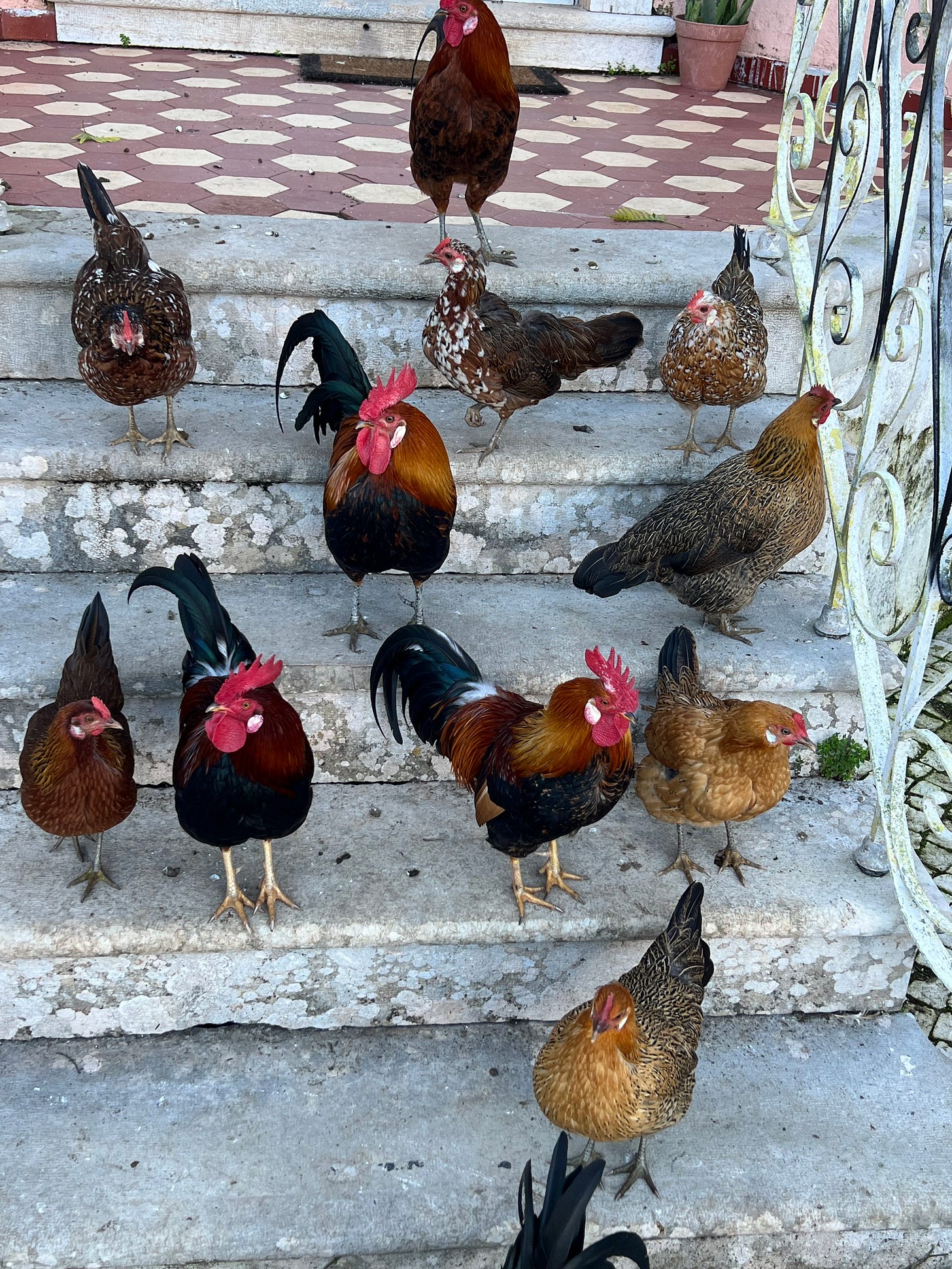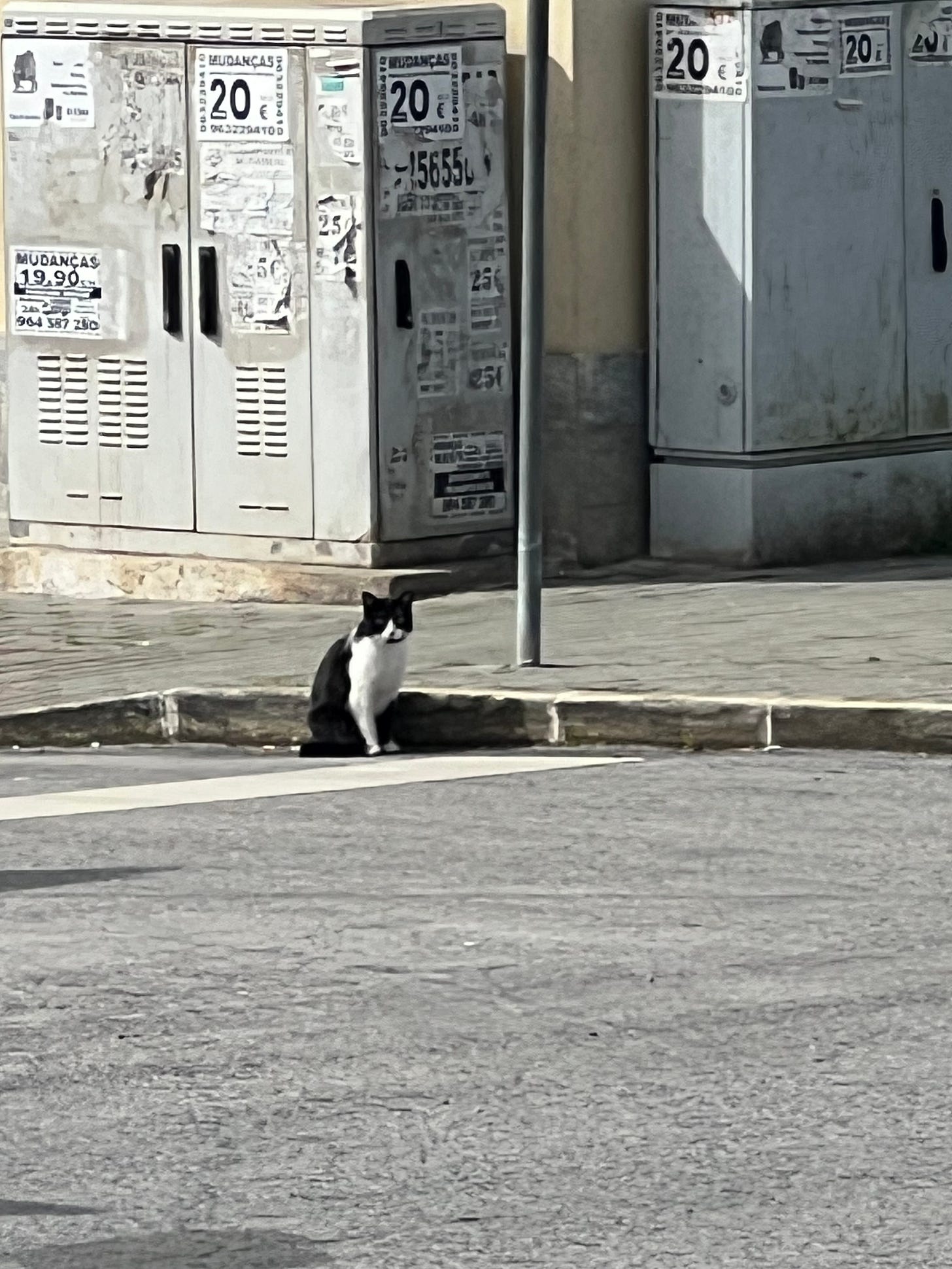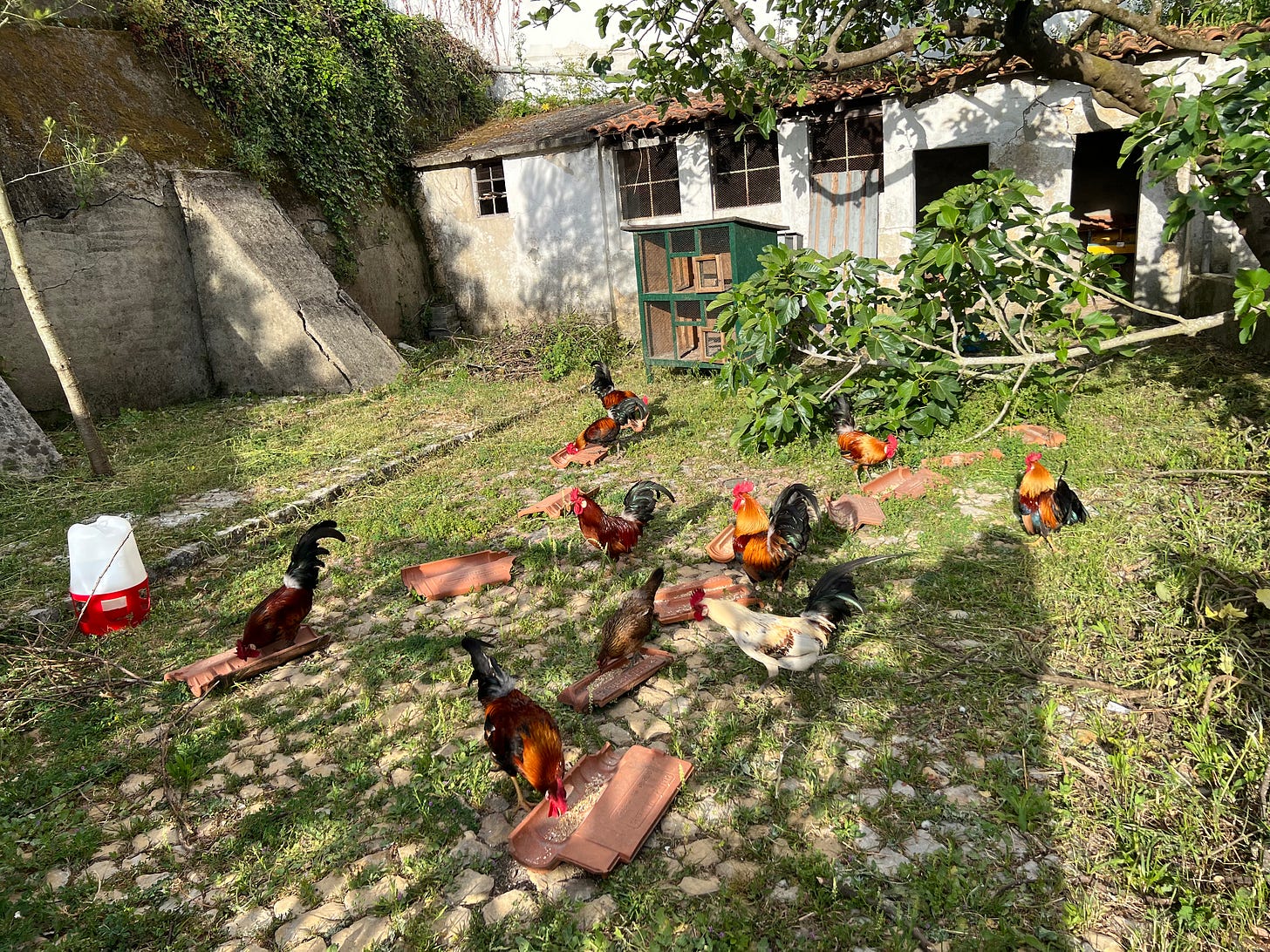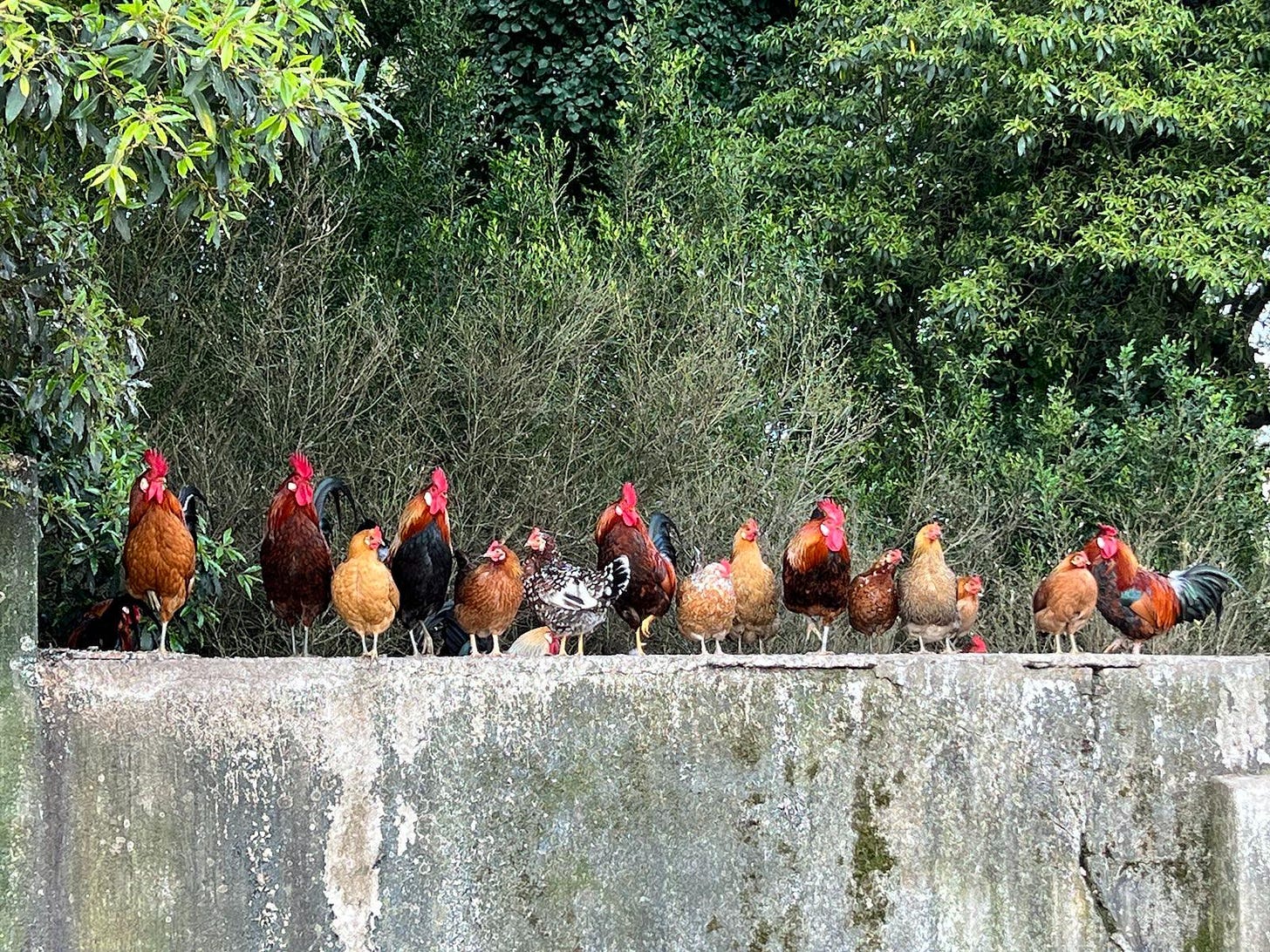A Killer Stalks The Flock
We wake to another sad discovery...now I'm mad.
Extremely sad today. I went out for the morning feeding and found another hen has gone missing. There is a predator systematically taking our hens. As near as I can tell, it has been going on for the past 20 days or so.
This feral flock of chickens pre-dates our ownership of the property. There were at least 15 hens when we moved in, and maybe 18 roosters.
In February we still had a plurality of hens. We knew about the two who had died - one in January along with her whole peep, one in February, of mysterious causes (we found her when we drained the koi pond). But there were still between 10 and 12. I confirmed this looking at various videos I took in January.
I remember at morning feeding a few times in the coop courtyard this spring thinking, huh, where are all my hennys? But often the flock divides itself into smaller groups, and one group might hang out in Picnic Flats and go up and eat later.
When Tiago mentioned I could buy more hens at the Saturday feiras I was surprised. The roosters have always outnumbered the hens but surely not to the point I needed to buy hens - or so I thought.
How many hens do you have, Tiago asked. Cinco? Quinze, I said without thinking. That’s how many we had. But his question brought the issue into sharp focus. As soon as I said it I knew we didn’t have that many anymore. I made a point to count them and it was nine. I was startled. Could that be right?
Then, in rapid succession, the hen nesting in the courtyard with her two hatchlings disappeared, along with one of her babies; we rescued the remaining orphan, Princess Leia. We found Goldie Hawn dead in the Secret Garden of unknown causes. Saturday night Stella went missing along with four of her babies - we rescued the three remaining.
Somewhere along the line the eastern flock, which numbered 12 for the longest time, was suddenly down to 10, with two hens gone, leaving only one among a company of nine roosters. I thought that the neighbor lady, who keeps nesting boxes in her backyard, might be keeping two hens locked up to hatch/mother babies, or just collect their eggs, but now I’m not so sure. Now I think they might have been among the first to die, I just didn’t know it.
And today I woke to find another hen missing - no trace of her.
Now here are only four hens left.
One neighbor speculated a fox was to blame. I’ve never seen one, but our property abuts the queen’s land, a very large tract of wild terrain. Across the street is an abandoned fazenda that looks like it was built around the same time as ours (100+ years ago), sitting in the midst of overgrown acreage - also like ours. I suppose a fox could be emerging from these lands to take chickens. We’ve never seen any trace of one though.
Neighbor Ana thinks it is a stray dog, and it’s possible - I’ve read there are a lot of stray dogs in Portugal, though I have never seen one in Belas. But I tend to doubt it, simply because a) dogs are scavengers, and would eat at our compost pile or any one of the numerous dumpsters in the village where restaurants and bakeries leave extra bags of bread before making the effort to climb a tree and b) climbing a tree in the night isn’t something a dog could accomplish without setting off all the other neighborhood dogs barking.
Alberto feels certain it’s a cat. From his vantage point high on the hill across the street, he has observed a cat in our campo with a chick in its mouth. Before you come, he says. But maybe the same. I see cats every day in my garden, he adds. We’ve seen them too, prowling his driveway and even sitting on the roof of his workshop.
I tend to agree with Alberto. Whatever is stalking and killing our chicks and hens is strong enough to carry a hen away, is climbing trees to catch them and is around a lot. Which makes a cat the most likely culprit.
There are many, many cats around - the neighbor has two that she allows to roam at will, I see them all over the village. I’ve spotted a number of cats on my walks with Jake, and there are two “cat condominiums” that I know of, where village ladies have piled crates and boxes with curtains, leaving food and water for strays that congregate there. I regularly see four or five cats within a quarter mile radius of our property - this little tuxedo kitty, below, can often be seen on our property. Once he tried to climb in a window; another time I found him in front of the quinta doorway. I took this picture in the neighborhood up behind the Back 40.
Only a few days ago I spotted a gross-looking hairless white cat up near the recently cleared sunken garden. It was slinking along low to the ground, toward a lone rooster we’ve named Larry. I actually didn’t know what it was at first, I simply dropped what I was doing and ran directly at it, fast. It let me get unnervingly close before it turned and ran off. I threw a rock at it’s departing derriere.
Poor Larry seems to have a stone caught in his throat, or a case of laryngitis - he opens his beak and arches his neck but no crow issues forth. At one point he was a regular member of the eastern flock, but now is often alone. I’ve observed other roosters chasing him off. He looks despondent. When the h set water down for him the other day he immediately dipped his beak, not even waiting for us to move away. He took many drinks, poor fella. And when he spotted me walking up the road while the rest of the eastern flock occupied itself elsewhere he rushed toward me, clearly hoping for food. I make sure to feed him in his chosen territory, so he doesn’t have to fight the other roosters for it.
You have to lock the hens in the coop at night, my neighbor Alberto tells me. He’s right - but I’ll be going away for a couple of weeks, and I doubt I can get them into a routine of allowing themselves to be locked up at night before I depart and leave them in the care of a friend. I’m scared I’m going to come back to a flock of bachelor roosters, all my hens gone except the four orphans, of which I know one is a hen, and am 75% certain the other three are too.
I never intended on raising chickens when we came here, but gladly took on the feeding and care of this feral flock. I’m in awe that they have lived here so long, an unbroken family chain, while the place was abandoned for more than forty years. Village ladies sometimes left water and lettuce and uncooked rice. But mostly they have fended for themselves. They were scrawny when we first arrived, now they are beautifully filled out.
Last summer the flock boasted nearly 40 babies - about ten survived (including our favorite, Alphonse); at that point we had not even freed the coop of the brambles and weeds that had overtaken it. Now it’s cleaned up and lacks only doors to the coop building. I feel so guilty - I should have gotten those doors on, trained the hens to stay inside, safe, by now. I let the fact they’ve always been wild, my intimidation at the task of trying to get them accustomed to a new way of life, stop me from moving faster. I was complacent that plentiful food and water and the occasional snack of peanuts or mealworms and a nice tree to roost in was enough. Now most of my hens have perished, and if we don’t move fast to find out what is killing them, I’m afraid they’ll soon all be gone. How sad that would be.
The h has a game camera and we are charging it up and will position it tonight. At least we know exactly where to point it - the remaining hens are all roosting in the Secret Garden. Do they feel fear, I wonder, having witnessed this predator return again and again to take one of their own?
The h has his air gun ready. Whatever it turns out to be, I would far rather scare if off than maim or kill it, but I don’t think that will work, and I’m done watching the serial murder of the hens. If we catch it in the act - fox, cat, wild dog - it’s shortly going to be the next animal buried in the upper orchard. I hope I don’t sound like Kristi Noem but frankly I don’t care. I’m mad. There is no such thing as a hungry dog or cat in this village - hens don’t need to die to feed the already well fed. This predator has decimated a flock that has survived and thrived through years of hot summers, cold winters, lashing rain and wind, rats, owls and other predators. If it is not stopped, a family line that has remained intact for more than four decades through its own ingenuity and toughness will be destroyed.
As I write this, the handsome head of Alphonse appeared over the cardboard I use as a nominal gate when the front door is propped open. Most days it deters more intrepid members of the flock from wandering in. But Alphonse is special, and persistent; he hopped on top of the cardboard, balanced on the wobbly edge and then dropped into the entryway. He strolled over to look up at me, then wandered over to have a look in Jake’s food bowl. He is an elegant bird, with elegant manners.
I’ve been worried about his comings and goings with four orphan chicks running around, but I needn’t have. Roosters can be unpredictable, but Alphonse has always had a gentle nature, allowing us to pick him up and cuddle him, and sitting on my lap for extended periods and even relaxing next to Jake on the sun warmed concrete of the porch, his legs sticking comically out to the side. when He sits like this, his gorgeous tailfeathers resplendent in the sun, he resembles nothing so much as a Victorian gentleman in a fancy three piece suit who has taken off his trousers so that he might get some color on his pale legs.
This morning I came into the house after searching for the missing hen again, and heard loud cheeping coming from the living room. I went in and found Alphonse had slipped through the open back door and was helping himself to the dish containing chick food; the chicks stood all around him, complaining loudly; Princess Leia, always brave, darted her head in and out of the bowl of feed, as if to say I’ll be darned if I let you eat it all.
Alphonse paid them no mind and kept eating. I ushered him out the front, knowing he’d be back. And sure enough here he is again. I stopped writing about our hen disaster and picked him up, giving him a hug and a kiss. Let’s get you some peanuts, I told him. He warbled in expectation.
His warm pliability in my arms unlocked the grief I have been carrying for all this death around me, and I found myself sobbing into his feathers. He just let me, and when I was finished I set him down, shelled some peanuts and let him peck them out of my hand. I picked him up again, meaning to drop him out the front door, and he gently pecked the rim of my reading glasses once, twice. Maybe he saw my tears, magnified, and just wanted to wash his peanuts down. I wonder if he misses Goldie - they were often together, and he likely witnessed whatever caused her demise. Do chickens carry trauma? Watching Stanley wander lonely as a cloud in the apple orchard, where just a few days ago he proudly watched over Stella and her peep, I think yes.
I carried Alphonse around the house for a bit, taking comfort from the warmth of his feathery body. He seemed content to ride around in my arms until I finally released him out the back door. He hesitated, as usual, then wandered off to rejoin the diminished flock.








This is awful! I hope you are able to neutralize the killer before there is anymore loss of life.
I’m so sorry about the hens. I understand the pain 😞